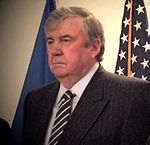
Parliamentary elections were held in Moldova on 6 March 2005. The result was a victory for the Party of Communists of the Republic of Moldova (PCRM), which won 56 of the 101 seats.

A referendum on remaining an independent nation was held in Moldova on 6 March 1994. Initiated by President Mircea Snegur, it was referred to as a "Consultation with the people", and was approved by 97.9% of voters.

Folketing elections were held in Denmark on 28 October 1947, except in the Faroe Islands where they were held on 18 February 1948. The Social Democratic Party remained the largest in the Folketing, with 57 of the 150 seats. Voter turnout was 86% in Denmark proper and 60% in the Faroes.
Presidential elections were held in Moldova on 17 November 1996, with a second round on 1 December. Whilst incumbent President Mircea Snegur received the most votes in the first round, he was defeated in the second by Petru Lucinschi.

Parliamentary elections were held in Moldova on 25 February 2001. The result was a victory for the Party of Communists of the Republic of Moldova (PCRM), which won 71 of the 101 seats.

Parliamentary elections were held in Moldova on 22 March 1998. The Party of Communists of the Republic of Moldova (PCRM) emerged as the largest party in Parliament, winning 40 of the 101 seats. However, the three other parties to win seats – the Democratic Convention of Moldova, For a Democratic and Prosperous Moldova (24), and the Party of Democratic Forces (11) – formed a coalition government which was later known as the Alliance for Democracy and Reforms, pushing the Communists in opposition until the next elections in 2001.

Early parliamentary elections were held in Moldova on 27 February 1994. They were the country's first competitive elections, and followed deadlock in Parliament over the issue of joining the Commonwealth of Independent States. The result was a victory for the Democratic Agrarian Party of Moldova (PDAM), which won 56 of the 104 seats.

The Braghiș Alliance was a six-party centre-left political alliance in Moldova.

A consultative constitutional referendum was held in Moldova on 23 May 1999. It was initiated by President Petru Lucinschi and asked voters whether they approved of changing the system of government to a presidential system. The proposal was approved by 64% of voters. However, the Party of Communists of the Republic of Moldova and the Alliance for Democracy and Reforms opposed Lucinschi, and were able to vote several constitutional changes through parliament on 5 July 2000. The changes reduced the powers of the president and strengthened the parliament and government.

General elections were held in Portugal on 28 April 1918, following a coup by Sidónio Pais in December 1917. The elections were boycotted by the Democratic Party, the Evolutionist Party and the Republican Union, who had won over 90% of the seats in the 1915 elections.
Federal elections were held in Switzerland on 29 October 1939. The Free Democratic Party emerged as the largest party in the National Council, winning 49 of the 187 seats. Due to the outbreak of World War II, there were no elections in nine of the 25 cantons; Appenzell Ausserrhoden, Lucerne, Neuchâtel, Schwyz, Solothurn, Ticino, Valais, Vaud and Zug. In what became known as "silent elections", a total of 55 candidates were elected unopposed.

Folketing elections were held in Denmark on 7 June 1864. The National Liberal Party emerged as the largest faction, winning 40 of the 101 seats. Following the elections, Christian Albrecht Bluhme became Prime Minister on 7 July.

The Social Democratic Alliance of Moldova was a political party in Moldova.

The Labour Party is a minor political party in Moldova led by Gheorghe Sima.

Folketing elections were held in Denmark on 1 December 1854. Following the elections, Peter Georg Bang became Prime Minister on 12 December.

Folketing elections were held in Denmark on 14 June 1855 in order to approve amendments to the constitution. Peter Georg Bang remained Prime Minister following the elections.

Folketing elections were held in Denmark on 14 June 1858. Carl Christian Hall remained Prime Minister following the elections.

Folketing elections were held in Denmark on 14 June 1861. Carl Christian Hall remained Prime Minister following the elections.

Elections to the Rigsrådets Folketing were held in Denmark on 30 May 1865. Christian Albrecht Bluhme remained Prime Minister after the elections, although only until November.

Folketing elections were held in Denmark on 22 September 1869. The Mellem Party emerged as the largest factions, winning 27 seats. Christian Emil Krag-Juel-Vind-Frijs remained Prime Minister.









